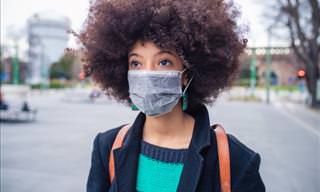Which Masks Are or Aren’t Effective?
We’ve seen it all during the past few weeks: people wearing surgical masks, makeshift respirators made of bottles, and even large plastic bottles or bags worn to cover the wearer’s entire head. Unfortunately, none of these methods can reliably prevent a person from catching any virus, really.
This is especially true in regard to the makeshift masks people create for themselves and their canines. The problem with these masks is that they are letting too much of the surrounding air pass through and cannot filter the air properly, so wearing those will provide more psychological relief than any real protection.
Apart from that, there are currently no known cases of the coronavirus spreading to dogs, so there’s no real need to make your pet wear the mask.
When it comes to surgical masks, these are slightly better than many makeshift masks, but their protective ability is likewise marginal. Similarly to makeshift masks, surgical masks are not capable of protecting you from viruses because they are not tightly fitted and let air in from all sides.
These masks are typically worn by surgeons and medical workers and are meant to cover the noses and mouths of the medical staff to prevent germs from spreading to a patient during surgery. While these masks are adequate at preventing the spread of infections from the wearer, their ability to stave off infections is not that great.
While many people also wear surgical masks when they have the flu to avoid infecting others, the best way to accomplish this goal is by just staying at home, as doctors assure. Surgical masks are also often used to fend off air pollution, especially in East Asian countries, but the pollutant particles are typically much larger than viruses, so these two uses should not be confused.

The only protective mask proven to fend off viruses like the coronavirus is a specialized mask called the N95 respirator (see photo below), which is used by medical staff dealing with extremely infectious diseases. This specific respirator is significantly thicker than a surgical mask, and it is tightly fitted to the face around its perimeter.
Should You Start Wearing the Respirator to Protect Yourself from the Coronavirus?
If you’re a medical worker and you’re dealing with patients with a dangerous virus, then you should definitely wear the respirator. But then again, if that is the case, you’re probably already aware of that. Anyone else isn’t recommended to wear the N95 respirator, at least not currently. There is no need for it, especially if you live outside of China since the number of people infected with the virus outside of China is very small.
 For example, there are only 11 reported cases of coronavirus in the US as of February 4th, 2020. Apart from that, as of the same date, the death rate of the coronavirus is 2.1%, compared to 6.7% of the 2019-2020 influenza virus, which already took 10,000 lives in the US alone.
For example, there are only 11 reported cases of coronavirus in the US as of February 4th, 2020. Apart from that, as of the same date, the death rate of the coronavirus is 2.1%, compared to 6.7% of the 2019-2020 influenza virus, which already took 10,000 lives in the US alone.Apart from that, the N95 respirator is significantly more difficult to breathe in than a surgical mask, as it’s made of a much thicker fabric, which could make long-term wear challenging and even harmful, especially for people with preexisting cardiovascular and respiratory issues.
In addition, proper wear of the N95 respirator requires special training, since the mask must fit around the nose, chin, and cheeks properly so that no air passes through the edges of the mask. Of course, whether or not you decide to use any protective gear or mask is up to you, but as of now, medical experts think it's unnecessary and recommend using other preventative methods, such as:
- Canceling any trips to China, the source of the virus, where more than 20,000 people have been infected as of February 4th, 2020.
- Don't touch your nose, mouth, or eyes in public spaces or with unwashed hands.
- Wash your hands more thoroughly and more often.
- Clean and disinfect objects and surfaces which are touched frequently, such as door handles, cutlery, smartphones, etc.
- Avoid contact with sick people.
 Go to BabaMail
Go to BabaMail




























